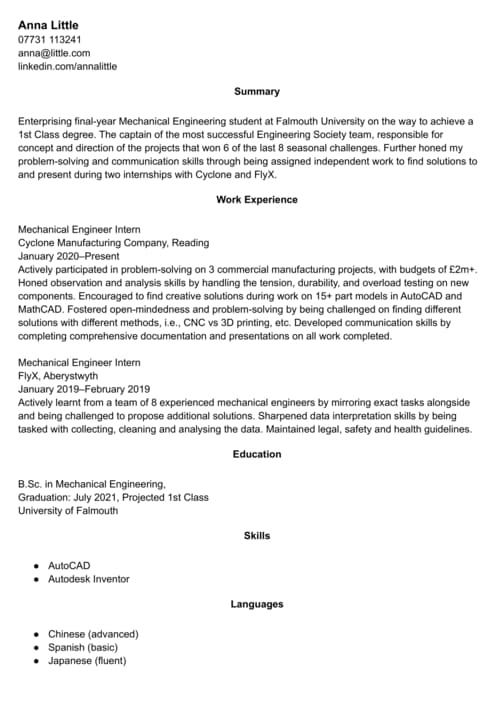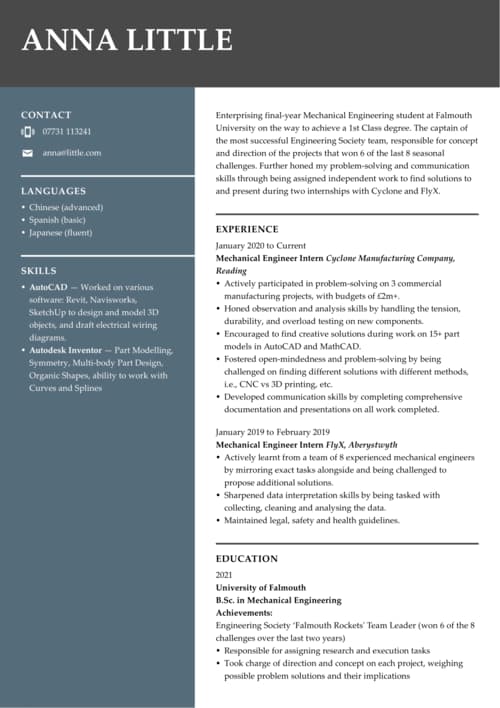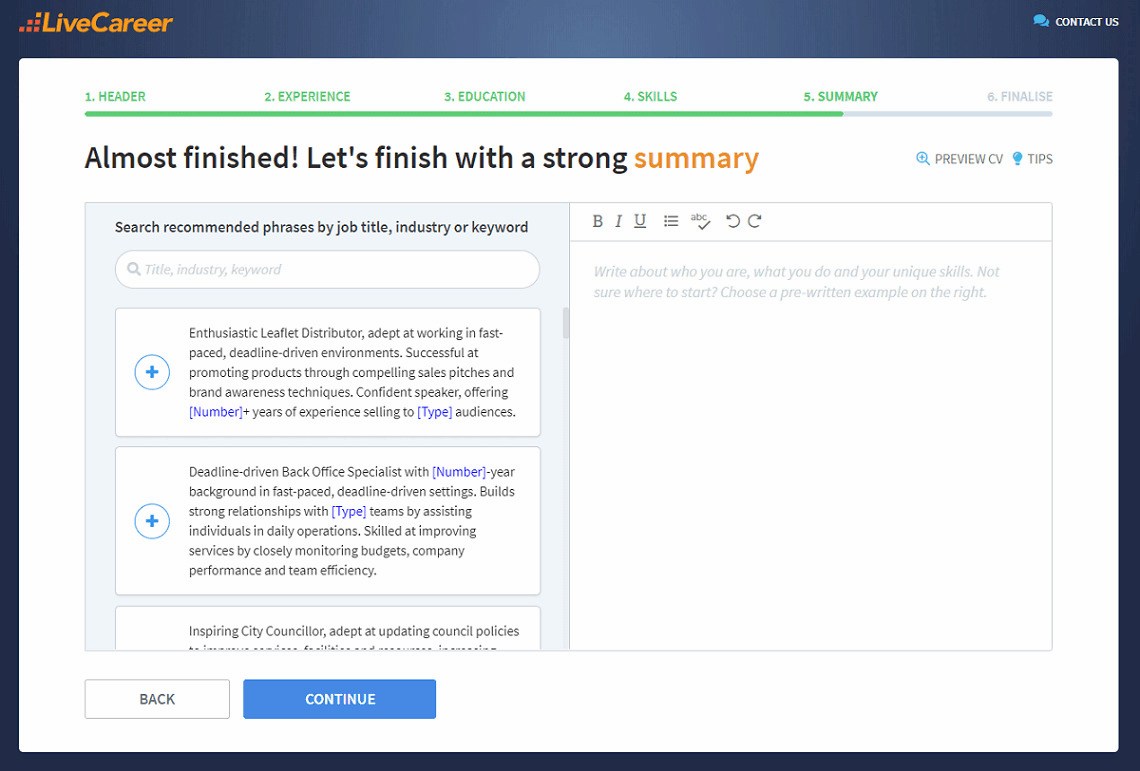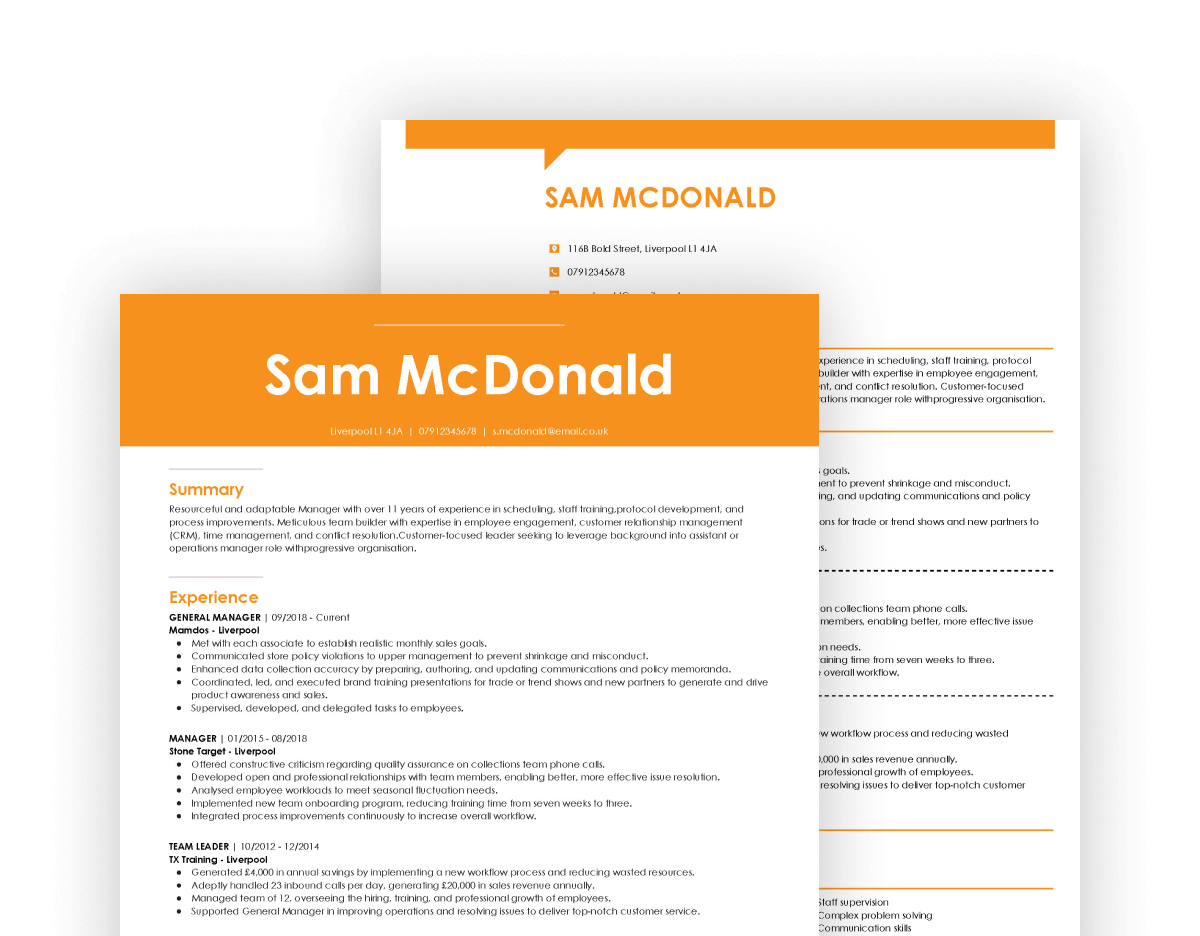Create a professional CV now!
 NO
NO YES
YESOur customers were hired by:
Critical thinking skills are different components of a disciplined process of actively analysing, synthesising, conceptualising, evaluating and applying information and facts to form judgements. The key goal of effective critical thinking is to be rational and unbiased in analysis. Highly desirable traits in today’s workplace.
So how do you write ‘I think pretty good’, without writing ‘I think pretty good’? By taking each of the separate components, and showing you apply them to gain valid information, insights and judgements you can use to make good business decisions.
In this guide, you will find a plentiful list of critical thinking skills examples, a real-life CV example and advice on ways to include your strengths. Shall we start?
Create an effective CV in minutes. Choose a professional CV template and fill in every section of your CV in a flash using ready-made content and expert tips.
Create a professional CV now!
 NO
NO YES
YESWe created the sample on the right using our builder. See other good CV examples like this one.
Crafting a skills list for a CV? You might want to view these guides, too:
Anna Little
07731 113241
anna@little.com
linkedin.com/annalittle
Enterprising final-year Mechanical Engineering student at Falmouth University on the way to achieve a 1st Class degree. The captain of the most successful Engineering Society team, responsible for concept and direction of the projects that won 6 of the last 8 seasonal challenges. Further honed my problem-solving and communication skills through being assigned independent work to find solutions to and present during two internships with Cyclone and FlyX.
Mechanical Engineer Intern
Cyclone Manufacturing Company, Reading
January 2020–Present
Mechanical Engineer Intern
FlyX, Aberystwyth
January 2019–February 2019
B.Sc. in Mechanical Engineering,
Graduation: July 2021, Projected 1st Class
University of Falmouth
Achievements:
Engineering Society ‘Falmouth Rockets’ Team Leader (won 6 of the 8 challenges over the last two years)
The transferable skills that make up components of critical thinking are found everywhere, and can be applied anywhere. The first key consideration is to apply them correctly and gain a benefit from it, instead of wasting your time and energy.
The second is weaving them correctly into your CV, but more about that later. Let’s start with a list of examples of critical thinking skills that should set you on the right path to finding the exact examples that will impress your employer.
Observation is the most basic act of capturing information. Spotting patterns and subtle details naturally can be a huge advantage. Just ensure you can prove that it’s relevant, and act on it. Examples of spotting a workplace problem before it happened can make a great CV bullet point about your observational skills.
The planning of your research, your ability to collect valid data, as well as the way you process it, provide the raw fuel for critical thinking. By collecting information, you gather truth and facts, and help to remove the potential dead ends.
Sometimes, spotting subtle details isn’t enough, and a big picture is needed. Whether you’re good at listening, or a master of mySQL databases, the ability to capture and process information is always desired. So talk about what you did with data and to what end.
Interpretation of information is seeking to give it meaning. Spotting trends, patterns, and inconsistencies whether naturally or by analysis is one thing. But actually interpreting what it means in terms of both origin, and implication is what makes the big bucks.
Evaluation is a critical thinking skill encompassing appraising the validity, accuracy, authority, or bias of any piece or source of information. Understanding the who, what, when, where and why. The strength of your decision and conclusions may be affected by a confounding factor.
Communication skills are essential both in the earlier stages of gathering and analysing information, as well as in the stage of reporting the results and implications, which may also include the written form.
Being open-minded is a critical thinking skill that lets you always stay up to date and in front of new challenges, instead of being stuck in the old, stodgy ways of thinking. By taking into account other possibilities and points of view, you allow room for improvement.
The ability to think outside the box is extremely useful in a world full of boxes. Multiple solutions or answers may be available, and it isn’t always the first, the easiest or the most obvious one that is right for the conditions.
Strong critical thinking and problem-solving skills allow you to go from research, analysis and interpretation to preventative or responsive action. Finding realistic, effective and affordable solutions is an invaluable ability in an employee.
A strong CV summary will convince the recruiter you’re the perfect candidate. Save time and choose a ready-made personal statement written by career experts and adjust it to your needs in the LiveCareer CV builder.

Talking about your critical thinking skills and the achievements they made accessible is easy, you have time to elaborate. Figuring out how to write a CV filled with critical thinking skills is more challenging, but that’s what we’re here for.
What needs to be included in your CV? Certainly, a CV summary, aka CV profile, should take prideful place right at the top of the page. It allows the recruiter to quickly establish what you’re about, and plugging in the right skills there will draw them in to find out more depth about you.
Enterprising final-year Mechanical Engineering student at Falmouth University on the way to achieve a 1st Class degree. The captain of the most successful Engineering Society team, responsible for concept and direction of the projects that won 6 of the last 8 seasonal challenges. Further honed my problem-solving and communication skills through being assigned independent work to find solutions to and present during two internships with Cyclone and FlyX.
The work experience section should be studded with your critical thinking skills. This is the meat of your whole CV, and opportunity to cover most ground with what you need to talk about. You may find these CV tips helpful.
Mechanical Engineer Intern
Cyclone Manufacturing Company, Reading
January 2020
Writing a student CV right out of school may make it difficult to provide real-work examples of critical thinking skills. What helps is that university is all about critical thinking. Your CV education section can bolster your changes with relevant modules or extracurricular activities that seem relevant.
But if you’re a more experienced jobseeker just stick to the basics, putting your degree on your CV with just the essential facts.
Education
B.Sc. in Mechanical Engineering,
Graduation: July 2021, Projected 1st Class
University of Falmouth
Achievements:
Engineering Society ‘Falmouth Rockets’ Team Leader (won 6 of the 8 challenges over the last two years)
Since this guide is about critical thinking skills, your CV skills section should be full of them, right? Yes, and no. There is certainly no use putting ‘Evaluation’ or ‘Communication’ and three other nouns on a list with no elaboration.
If you have followed this guide, your previous sections should already be studded with fleshed-out examples of you applying these skills. Now, you have a chance to either provide more depth on your strongest sides, or to provide additional information that didn’t quite make it before.
Since the job description beforehand focused mainly on soft skills, this skills section focuses on problem-solving using hard skills to provide the correct balance.
Skills
You don’t wrap up the perfect CV with a jungle of random personal facts adorned with an ‘Additional Info’ heading. Whatever you’re including, make sure it’s relevant, so your CV hobbies and interests section needs to provide you skills somewhat transferable to your job.
Create a clear structure by listing Languages, Certificates and Awards under separate, clear headings.
Certifications
Languages
It’s not as hard to develop your critical thinking skills as you think. Follow these simple tips to develop a critically honed mind that’ll make you more employable and better able to handle the flood of questionable information that comes your way.
Practising your active listening skills is a crucial aspect of critical thinking. Be attentive to gather every bit of information possible. As you listen, consider the motivations of others. Why did they say something? What prompted them to provide or withhold information? Gaining a full understanding allows you to react appropriately.
Asking questions goes hand-in-hand with active listening and is also essential to gather all the information needed for critical thinking. Question those who provide you with information to get all the details you need. Ask yourself questions about the accuracy and credibility of what you’re seeing. Critical thinking cannot take place without asking questions.
We aren’t algorithms. As humans, we’re prone to cognitive biases that are a barrier to critical thinking. They create errors in the way we receive and analyse information. Confirmation bias and the Dunning-Kruger effect are two well-known examples, but there are many others and you should learn more about them to recognise them in your own thinking.
Consider the potential outcomes of your decisions and strategies. What could the end result be, including its impact on other people. Having the ability to weigh up the consequences will improve your critical thinking skills immensely.
It’s just as important to look back as it is to look forward. What happened the last time you made a similar decision? What were the consequences and what could be improved upon. Learn from your past mistakes and successes to better consider future scenarios.
You’re not always right, and you don’t know everything. It’s a bitter pill to swallow, but we all have our limitations. If you’re not an expert then check with a source that is, and if you get it wrong, admit and understand why you were wrong, so it doesn’t happen again.
Do you need to apply critical thinking to a complex task? Don’t try to tackle it all in one go. Break down the problem into separate components to consider. Establish a step-by-step process to follow and even the most complex task will be easier to think through critically.
Narrow thinking is anathema to critical thinking. Grow your knowledge at work by speaking to colleagues in different departments and understanding their tasks, needs and motivations. Listen to people with different opinions to your own. Casting your net of knowledge widely will help you to grow as a critical thinker.
Thanks to the globalisation of learning, you don’t need to attend a crusty university to learn how to think more effectively. You can connect with the crusty school from a distance, gaining a foundation in critical thinking skills using one of many online courses provided by reputable institutions through different e-learning platforms.
Also, studies show that brain training games enhance cognitive function, so there already are simple things you can do today.
Make sure you consider your critical thinking skills among the things to include in your cover letter. It gives you room for elaboration that your CV will never be able to. Within you can provide specific examples of you using the critical thinking skills, instead of being general and descriptive.
You don’t have to be a CV writing expert. In the LiveCareer CV builder you’ll find ready-made content for every industry and position, which you can then add with a single click.

If you’re still short of examples of critical thinking skills, or you just need some advice on how to include critical thinking in your CV, then let us know in the comments section. We’re here to help.
Our editorial team has reviewed this article for compliance with Livecareer’s editorial guidelines. It’s to ensure that our expert advice and recommendations are consistent across all our career guides and align with current CV and cover letter writing standards and trends. We’re trusted by over 10 million job seekers, supporting them on their way to finding their dream job. Each article is preceded by research and scrutiny to ensure our content responds to current market trends and demand.
About the author
Since 2013, the LiveCareer UK team has shared the best advice to help you advance your career. Experts from our UK editorial team have written more than one hundred guides on how to write the perfect CV or cover letter.
Rate this article:
Critical thinking skills
Average:

How long should a CV be in 2025? Learn whether you should write a one-page CV and get tips on keeping it concise with our template and examples.
Your portfolio is essential, but you won’t get any modelling jobs without an outstanding CV. See how to write a model CV with UK examples and a template.
See our beauty therapist CV template. Learn how to write beauty therapist CV with our sample CV and examples. Also for beauty therapists with no experience.
Our customers were hired by: